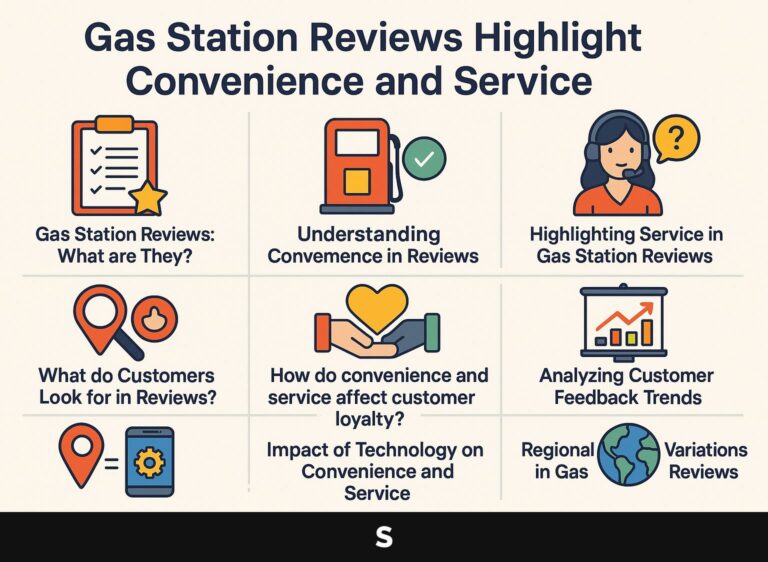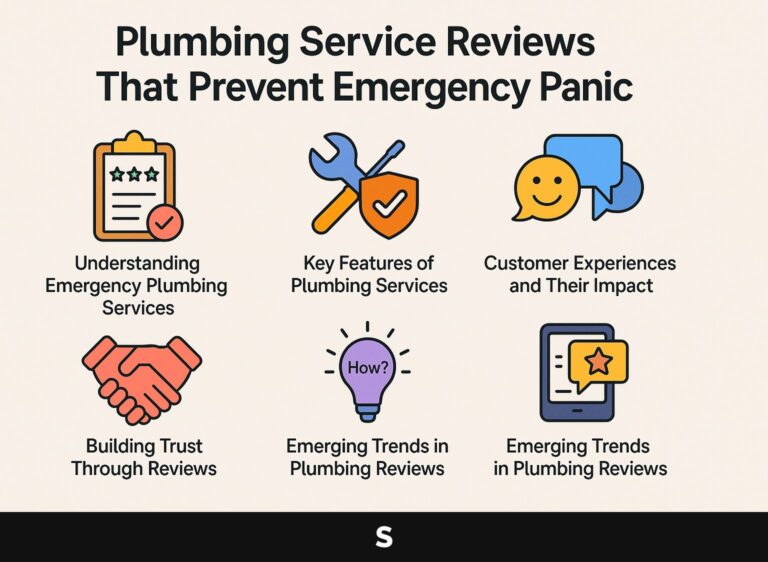Tax Consultancy Reviews That Show Real Savings
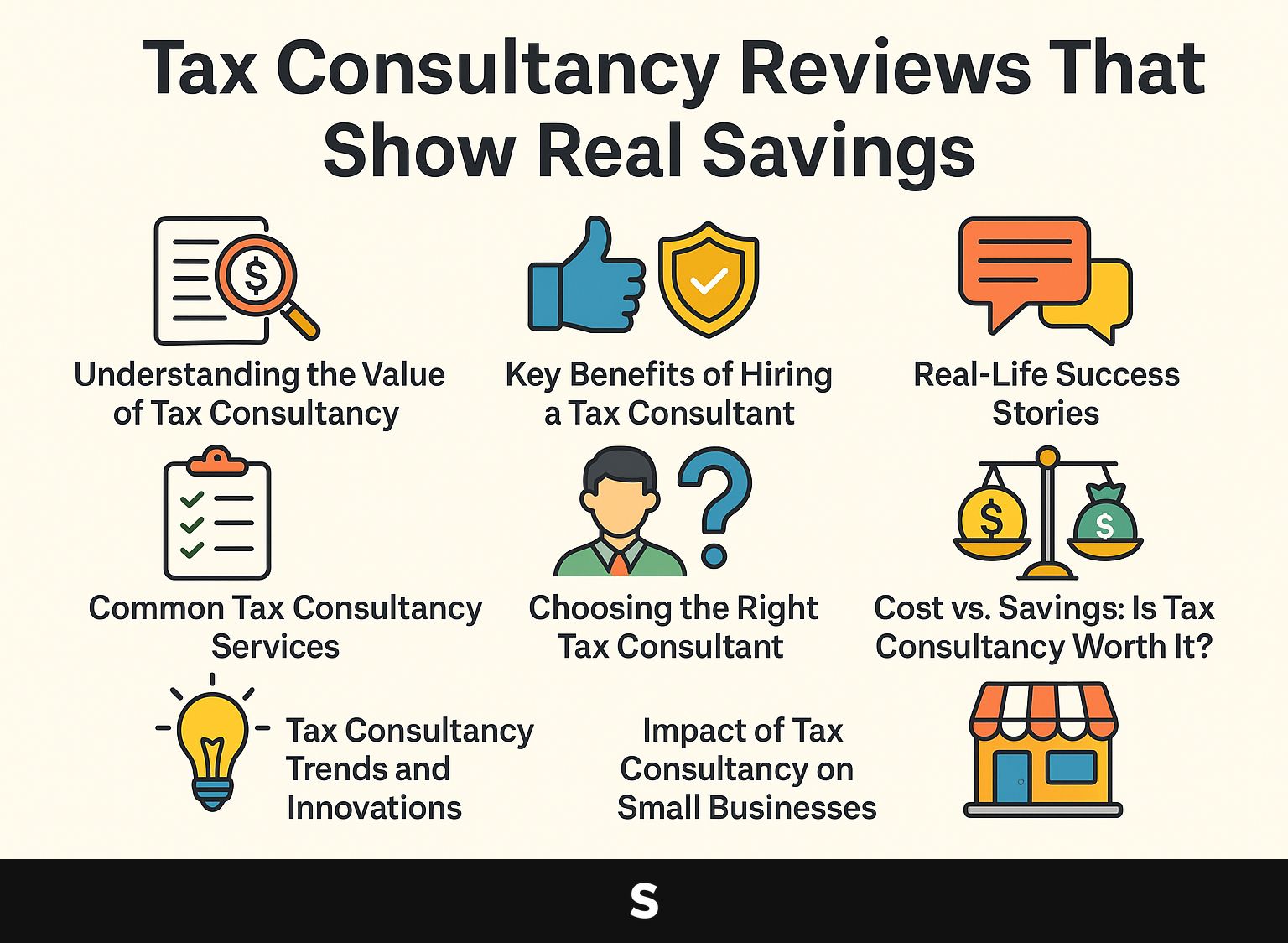
As tax season 2025 approaches, many are looking for ways to maximize their savings and ease their filing stress. With RamseyTrusted tax pros, including Certified Public Accountants and Enrolled Agents, you can turn to expert reviews that reveal hidden deductions and provide year-round support.
This article explains how targeted tax advice can lead to significant savings, featuring real-life examples and practical tips to help you make wise financial decisions this tax season.
Key Takeaways:
- Tax consultancy helps you save money by finding overlooked tax deductions, arranging your financial paperwork, and planning for upcoming savings.
- Real-life success stories, such as CPA David finding a $5,000 deduction, show the benefit of hiring a tax consultant.
- When selecting a tax consultant, check their credentials, review their past work, and ask questions during a meeting to make sure they meet your needs.
- Tax Consultancy Reviews That Show Real Savings
- The Importance of Tax Advice
- Key Benefits of Hiring a Tax Consultant
- Real-Life Success Stories
- Common Tax Consultancy Services
- Choosing the Right Tax Consultant
- Cost vs. Savings: Is Tax Consultancy Worth It?
- Tax Consultancy Trends and Innovations
- Impact of Tax Consultancy on Small Businesses
- Potential Drawbacks of Tax Consultancy
- The Future Of Tax Consultancy.
- Frequently Asked Questions
- 1. What is a tax consultancy review that shows real savings?
- 2. How does a tax consultancy review save me money?
- 3. Can anyone benefit from a tax consultancy review?
- 4. How do I choose the right tax consultancy for a review?
- 5. Are tax consultancy reviews worth the cost?
- 6. How often should I get a tax consultancy review?
Tax Consultancy Reviews That Show Real Savings
Tax consultancy reviews show how clients save money and gain from professional tax services, showcasing actual savings and useful methods.
What are tax consultancy reviews?
Tax consultancy reviews are evaluations provided by clients detailing their experiences and outcomes after utilizing tax services, often featuring specific financial results.
To build the credibility of tax consultants, gather reviews regularly through websites like Trustpilot or by asking clients for their opinions after providing services.
For example, after completing a tax return, send a simple follow-up email requesting a review, highlighting its importance for your business.
Display these reviews on your website and social media to build trust. Consider responding to reviews, thanking clients for positive feedback and addressing any concerns, which can further solidify your reputation in the industry.
The Importance of Tax Advice
Knowing the importance of tax consultancy is important for both individuals and businesses, as good tax strategies can result in big financial savings and reduce stress.
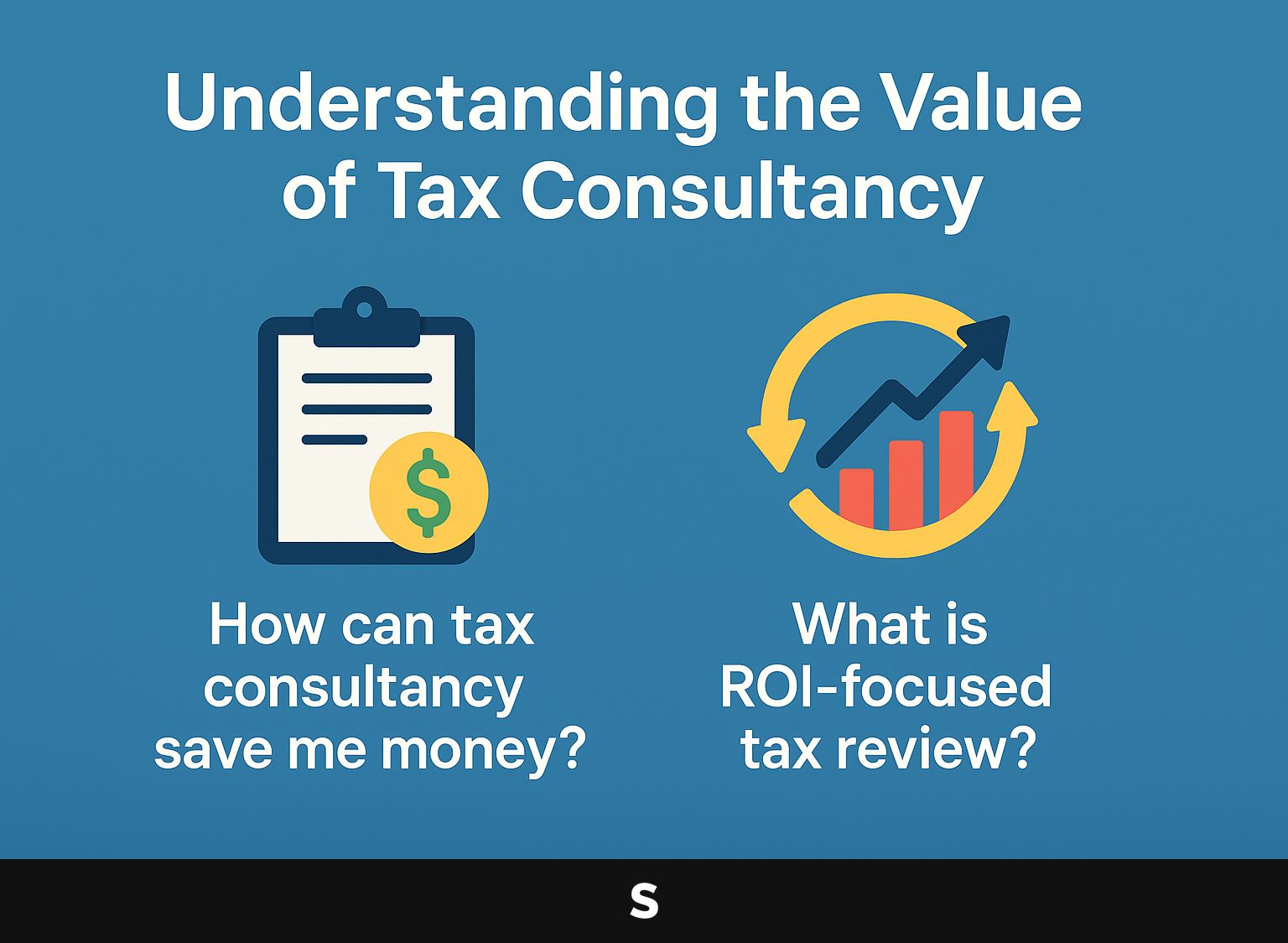
1. How can tax consultancy save me money?
A tax consultant helps you save money by finding missed deductions, using good strategies, and following IRS rules to get the most out of your tax returns.
A good method is to carefully examine previous submissions. Many taxpayers overlook deductions related to medical expenses, mortgage interest, and home office costs.
For example, if a taxpayer worked from home, they might qualify for a home office deduction, which can significantly reduce taxable income.
Proactively advising clients about contributions to retirement accounts can lead to substantial savings. Tools such as tax software can find possible deductions, while a yearly financial check can reveal overlooked chances for savings and compliance changes, helping clients get the most from their returns.
2. What is ROI-focused tax review?
A tax review centered on getting better returns helps clients increase their profits by using practical tax methods and customized guidance from experts.
To carry out a successful tax review focused on return on investment, start by evaluating your client’s financial details, such as income, expenses, and current tax plans.
Use tools like TurboTax Business or H&R Block to analyze previous filings. Next, create ongoing adjustments based on real-time financial performance and tax law changes, ensuring clients benefit from deductions and credits.
Support during the year should have monthly meetings and detailed reports. These reports should point out practical ideas to save money and offer yearly financial forecasts, helping clients make informed decisions throughout the year.
Key Benefits of Hiring a Tax Consultant
Hiring a tax consultant can offer many benefits, like maximizing deductions and reducing stress during tax season, making them very helpful for both individuals and businesses.
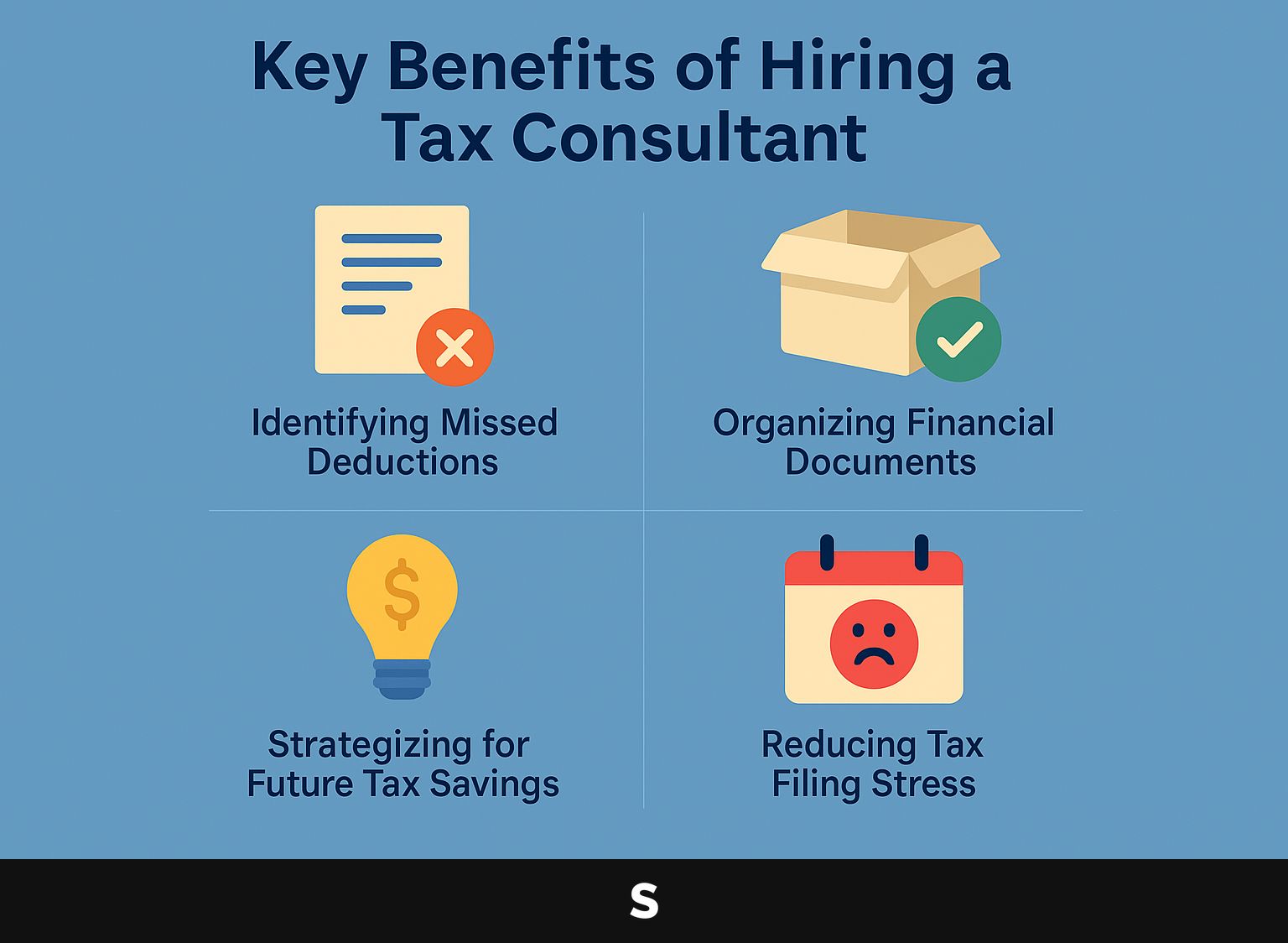
1. Identifying missed deductions
Tax consultants focus on finding overlooked deductions. By knowing tax laws and carefully checking documents, they help clients save a lot of money every year.
Commonly overlooked deductions include:
- Client entertainment expenses
- Home office costs
- Unreimbursed business expenses
To find these savings, consultants typically start by having a detailed interview to learn about the client’s actions and financial documents. They then analyze expense categories, paying close attention to receipts and transaction details.
Consultants compare client records with IRS rules to find potential deductions and make a custom tax plan that boosts savings while staying within regulations.
2. Organizing financial documents
Tax advisors organize financial papers to simplify tax preparation and reduce filing costs. To help clients stay organized, tax consultants recommend using tools like Dropbox or Google Drive for digital document storage.
Organizing folders by category-like income, deductions, and receipts-makes it easy to find what you need. Suggest that clients dedicate a specific time each month to review and upload receipts, thereby preventing the last-minute scramble.
Year-round maintenance is important; consider letting clients know about key dates, like quarterly estimated tax payments, to encourage regular organization.
3. Strategizing for future tax savings
Preparing for tax savings involves anticipating and forecasting. Tax consultants guide clients through tax code changes to get the most benefits.
Tax consultants often advise clients to adjust their withholdings based on projections of their income and expenses. For instance, if a business anticipates a surge in revenue, increasing withholdings can help minimize tax liability at year-end.
Utilizing tax-advantaged accounts like IRAs or HSAs allows clients to reduce taxable income while saving for retirement or healthcare costs.
It’s very important to plan for business costs because careful planning can lead to large tax savings. Keeping up with tax code changes makes sure strategies work well and follow the rules.
4. Reducing tax filing stress
Hiring a tax consultant makes filing taxes easier and gives clients the confidence they need in what can be a challenging process.
A good consultant guides clients through the filing process by establishing a clear timeline for necessary documentation and deadlines. They use safe online platforms to share documents, which makes it simple to communicate.
Regular check-ins via phone or email help alleviate uncertainties. When choosing a consultant, focus on those with high customer service reviews because they typically give individual care.
Look for testimonials emphasizing responsiveness and support during critical periods. This method leads to teamwork, resulting in complete and on-time tax filings.
Real-Life Success Stories
Examples from real life show the clear advantages of hiring tax consultants, highlighting how their knowledgeable advice can result in substantial financial improvements.
1. Case Study: CPA David Finds a $5,000 Deduction
In an interesting example, CPA David found $5,000 in overlooked deductions for a client, showing how important professional tax reviews can be.
The client first gave simple financial papers and expected tax time to be easy. David carefully went through their expenses and found missed deductions like home office costs and unpaid medical bills. He used tax software like TurboTax to look at potential deductions more effectively. By helping the client step-by-step, they received a larger refund and learned about tax planning for upcoming years.
This example shows why it’s important to work with tax professionals to find missed savings and improve financial health.
2. Client testimonials on tax consultancy effectiveness
Client testimonials serve as powerful endorsements of tax consultancy effectiveness, revealing personal experiences and financial outcomes achieved through professional guidance.
For example, one client saw their yearly taxes go down by 35% after we applied custom strategies. Another client was happy to get a $5,000 refund they weren’t expecting.
Clients in these testimonials talk about how expert advice has reduced their stress, with many feeling more sure about their financial planning.
These stories show real savings and confidence, highlighting the complete worth of tax consultancy services in dealing with complicated tax situations.
Common Tax Consultancy Services
Common tax consultancy services include various services that help individuals and businesses manage complicated tax rules.
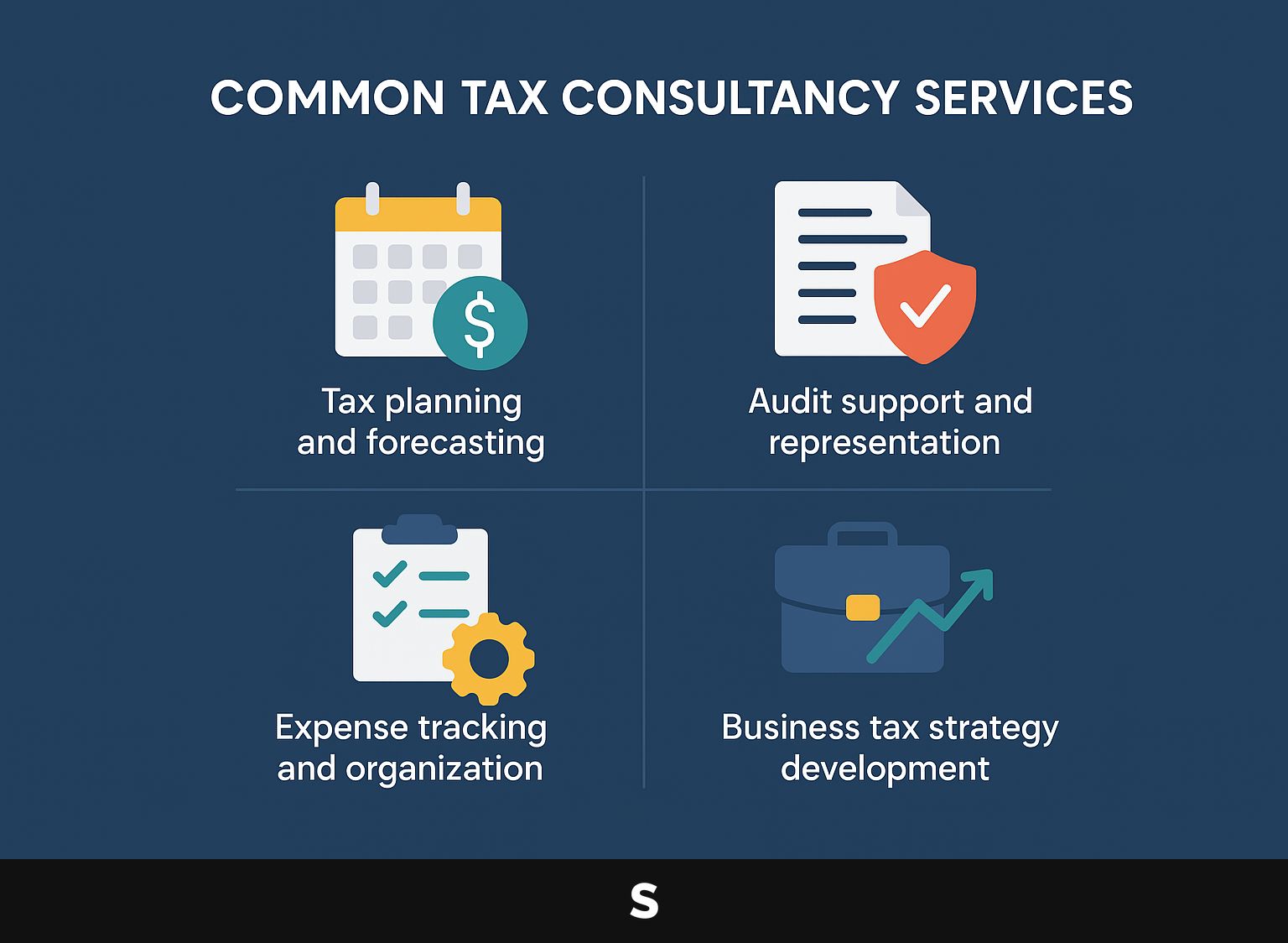
1. Tax planning and forecasting
Tax planning and forecasting help clients estimate their upcoming tax bills and create strategies to manage them, resulting in significant savings.
Good tax planning means knowing your current finances and predicting what you’ll earn and spend later. Tools like TaxAct or TurboTax can make it easier by giving estimates based on what you enter.
Methodologies such as the `Income Shifting Strategy’ allow clients to distribute income across family members to minimize tax burdens. For example, a client who adopted this approach last year effectively lowered their taxable income by $10,000, resulting in a tax savings of over $2,500.
Regular reviews are important to keep plans updated for life changes, such as new investments or job changes.
2. Audit support and representation
Audit support and representation are critical services provided by tax consultants, ensuring clients have expert guidance during IRS audits or inquiries. To prepare clients effectively, tax consultants follow a structured approach.
Initially, they carefully look over important documents, gathering necessary papers like tax returns, related files, and past communication with the IRS. Next, clear communication is set up with IRS agents to explain difficult topics and manage any possible disagreements.
For instance, in a recent case, a consultant helped a client resolve discrepancies, resulting in a favorable audit outcome by presenting clear and organized documentation. This active approach reduces client worry and increases the likelihood of a good outcome.
3. Expense tracking and organization
Consultants often help manage and organize expenses, ensuring clients have accurate financial records for tax filing.
One helpful approach is using accounting software such as QuickBooks or FreshBooks, which lets clients sort expenses as they occur. Consultants can train clients on using mobile apps, such as Expensify or Shoeboxed, to capture receipts instantly.
To maintain organized records year-round, establish a routine-review expenses weekly and reconcile them monthly. This method helps clients understand their finances better, lessening anxiety during tax time and making the most of tax deductions.
4. Business tax strategy development
Creating a strong tax plan for businesses is important for business owners. Tax consultants have expert knowledge to help increase profits and reduce liabilities.
These consultants begin by thoroughly analyzing a business’s financial data, identifying areas for potential tax deductions. For example, they might find chances to save on costs for starting a business, get credits for research and development, or claim deductions for a home office.
Tax consultants use tools like QuickBooks or Xero to monitor money movement and follow legal requirements. Successful strategies are often measured by key metrics such as reduced tax liabilities and increased cash flow, with many clients reporting savings of up to 30% in their overall tax costs.
Choosing the Right Tax Consultant
Picking the right tax advisor is important for managing taxes well and saving the most money, so careful research is necessary.
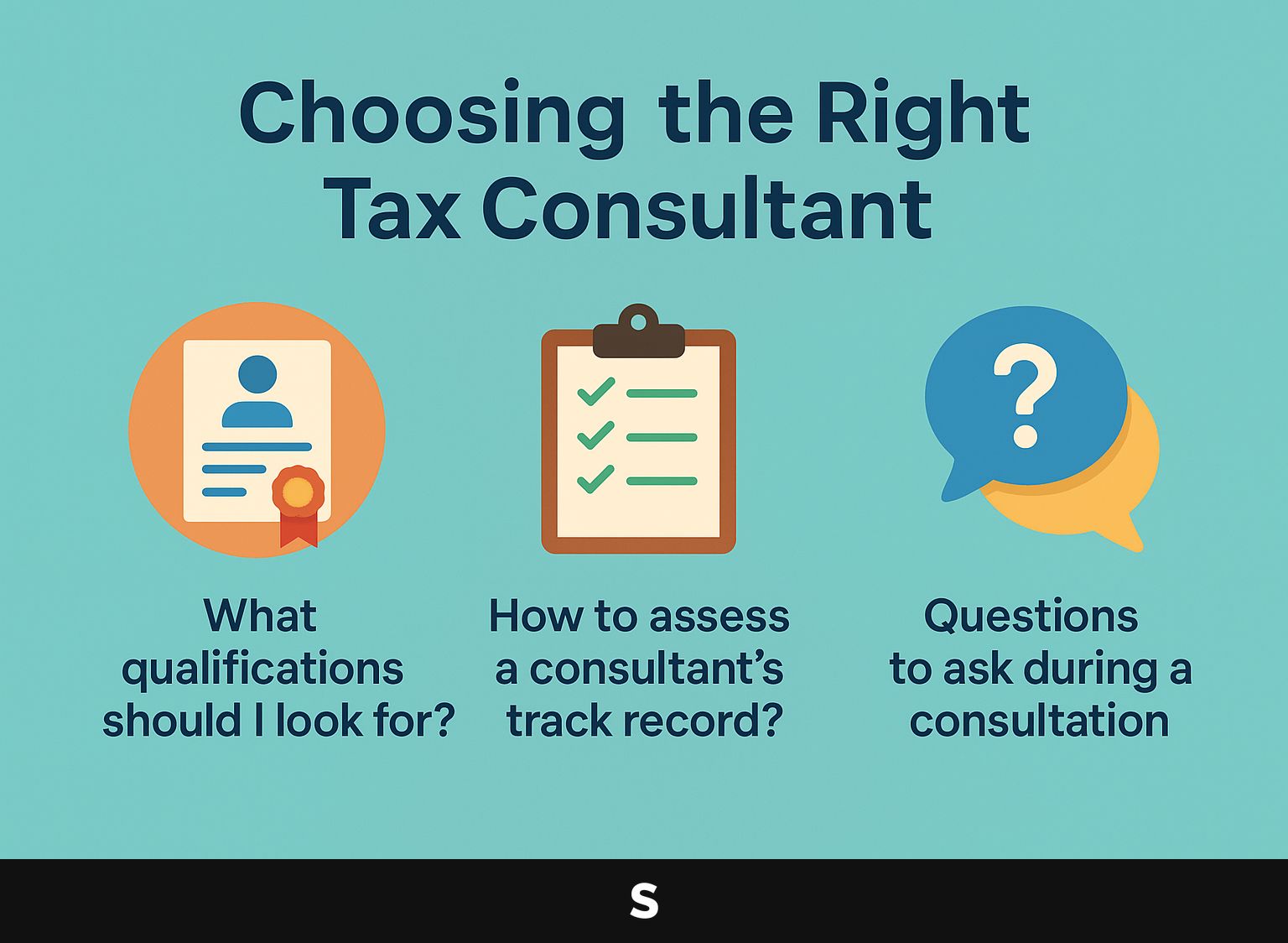
1. What qualifications should I look for?
When choosing a tax consultant, check if they have CPA or Enrolled Agent certifications, as these indicate their skill in handling tax issues.
Certified Public Accountants (CPAs) pass difficult exams and must keep learning to stay current with tax rules. Enrolled Agents are approved by the IRS and focus on tax representation, which makes them very helpful for audit support.
Find consultants who have a successful track record and good reviews from clients, as those with experience often provide better advice. Knowing the applicable tax laws and using the right software tools helps manage your finances properly.
2. How to assess a consultant’s track record?
Looking at a consultant’s past work means checking their previous client outcomes and feedback, which can show how well they perform and how dependable they are.
Start by checking platforms like Google Reviews, LinkedIn, and specialized sites such as Clutch.co for unbiased feedback. Ask the consultant for references and take the time to reach out to these clients to discuss their experiences.
It’s also beneficial to evaluate case studies or examples the consultant provides; these should illustrate tangible results and the approaches used. A thorough talk can show the consultant’s method, ensuring it fits your needs.
3. Questions to ask during a consultation
Asking the right questions in a meeting can help clients find the most suitable tax consultant for their needs and create a productive working relationship.
When talking to potential consultants, ask these important questions:
- What specific experience do you have with clients in my industry?
- Can you detail your tax strategies and how they align with my business goals?
- Inquire about your availability during the year-will I have direct access to you or a junior staff member?
- Follow up by asking for examples of successful tax savings achieved for previous clients.
These questions will help you understand their skills and how dedicated they are to providing good service and helping clients succeed.
Cost vs. Savings: Is Tax Consultancy Worth It?
Knowing the cost and savings of tax consultancy services helps clients decide if paying for professional tax help is worth it.
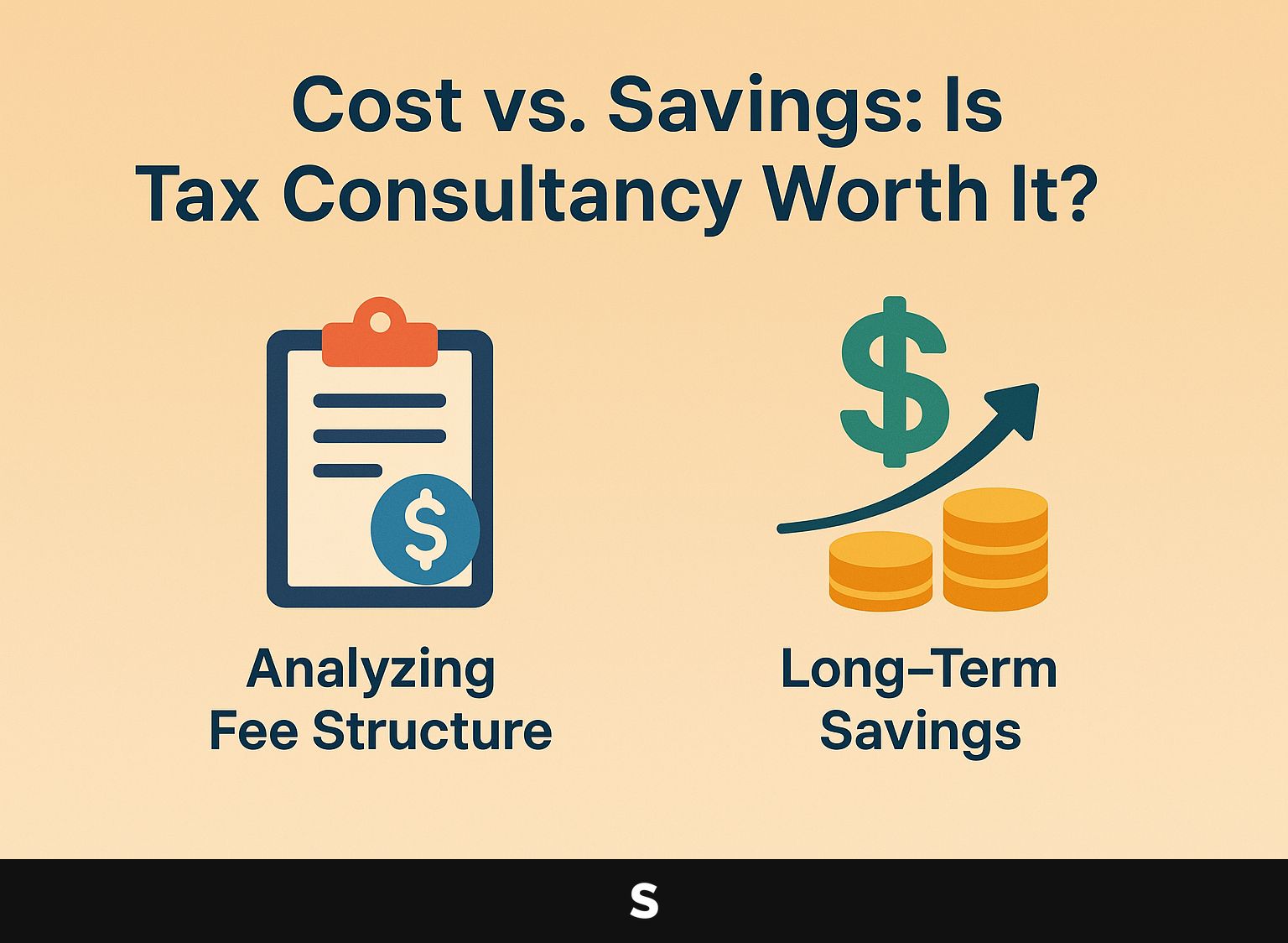
1. Analyzing the fee structure of tax consultants
Tax consultants typically charge fees based on their experience and the complexity of services provided, varying widely based on client needs.
Most consultants use an hourly rate structure or a flat fee for specific services. Hourly rates can be between $100 and $400, based on skill level.
An experienced consultant might charge $250 per hour for detailed tax planning, while a less experienced consultant might charge $100 for simple tax filing.
Flat fees can differ widely; basic tax returns might cost about $200, while detailed business tax services could be $1,000 or higher. Clients should discuss potential costs upfront to align services with their budget.
2. Long-term savings versus upfront costs
Although the initial fees for tax advice might seem expensive, the money saved over time usually surpasses these early expenses, justifying the cost.
For example, a client spent $1,500 on tax planning and later saved $4,000 by improving their deductions. Another, who paid $2,000, adjusted their business structure, resulting in $7,000 in reduced taxes.
Using tools like TurboTax or consulting with services like H&R Block can offer specific tax strategies that result in significant advantages. The key lies in assessing individual tax situations early in the year, allowing these professionals to identify and implement effective strategies before tax deadlines.
Tax Consultancy Trends and Innovations
Tax consultancy is changing quickly due to technology and new methods that improve the success of tax planning and preparation.
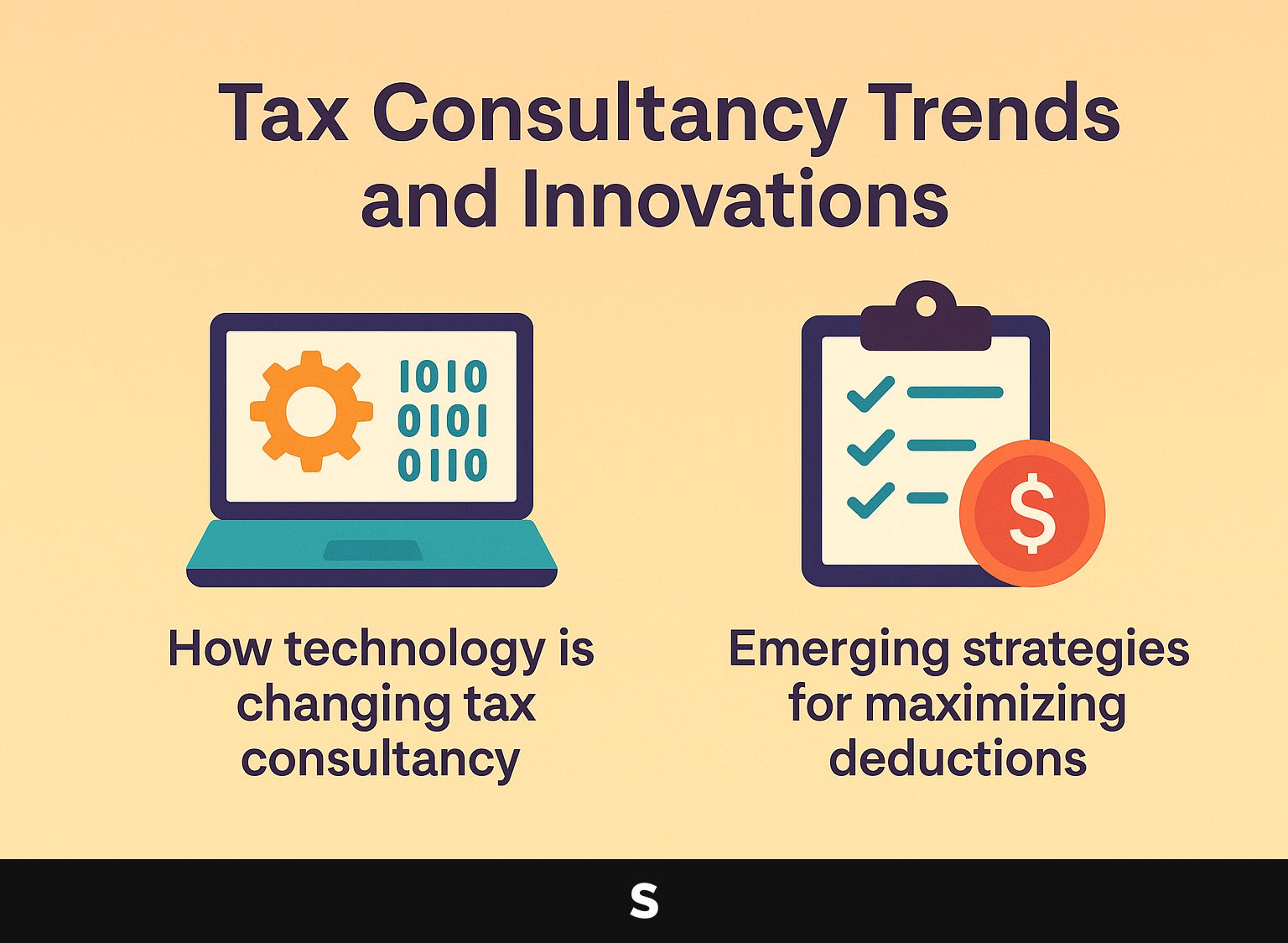
1. How technology is changing tax consultancy
Technology is reshaping tax consultancy by streamlining processes, facilitating better client communication, and enabling efficient data management.
For instance, IRS e-file systems, such as Intuit ProConnect, allow consultants to submit returns electronically, reducing processing time by days.
Cloud-based accounting software such as QuickBooks Online allows clients to work together more easily by letting them view up-to-date financial information and talk directly with their consultants.
Tools like Slack can make ongoing discussions easier, keeping clients informed about their tax situations. By using these technologies, consultants can provide faster and more engaging service, increasing client satisfaction and improving business operations.
2. Emerging strategies for maximizing deductions
New strategies for getting more deductions use creative methods and recent tax code updates to greatly help clients.
Consultants are more frequently using advanced tools like Expensify and QuickBooks for tracking expenses. These tools sort expenses into categories and show up-to-date information.
These tools help clients monitor their spending habits and identify expenses they can deduct more accurately. Keeping up with the latest tax code changes, like updates on business meals or home office deductions, helps consultants give good advice to their clients.
Regular webinars and ongoing education courses help them stay updated on these changes, improving their ability to give advice.
Impact of Tax Consultancy on Small Businesses
Tax consultancy is very helpful for small businesses by providing essential assistance with business taxes and making sure they follow tax laws.
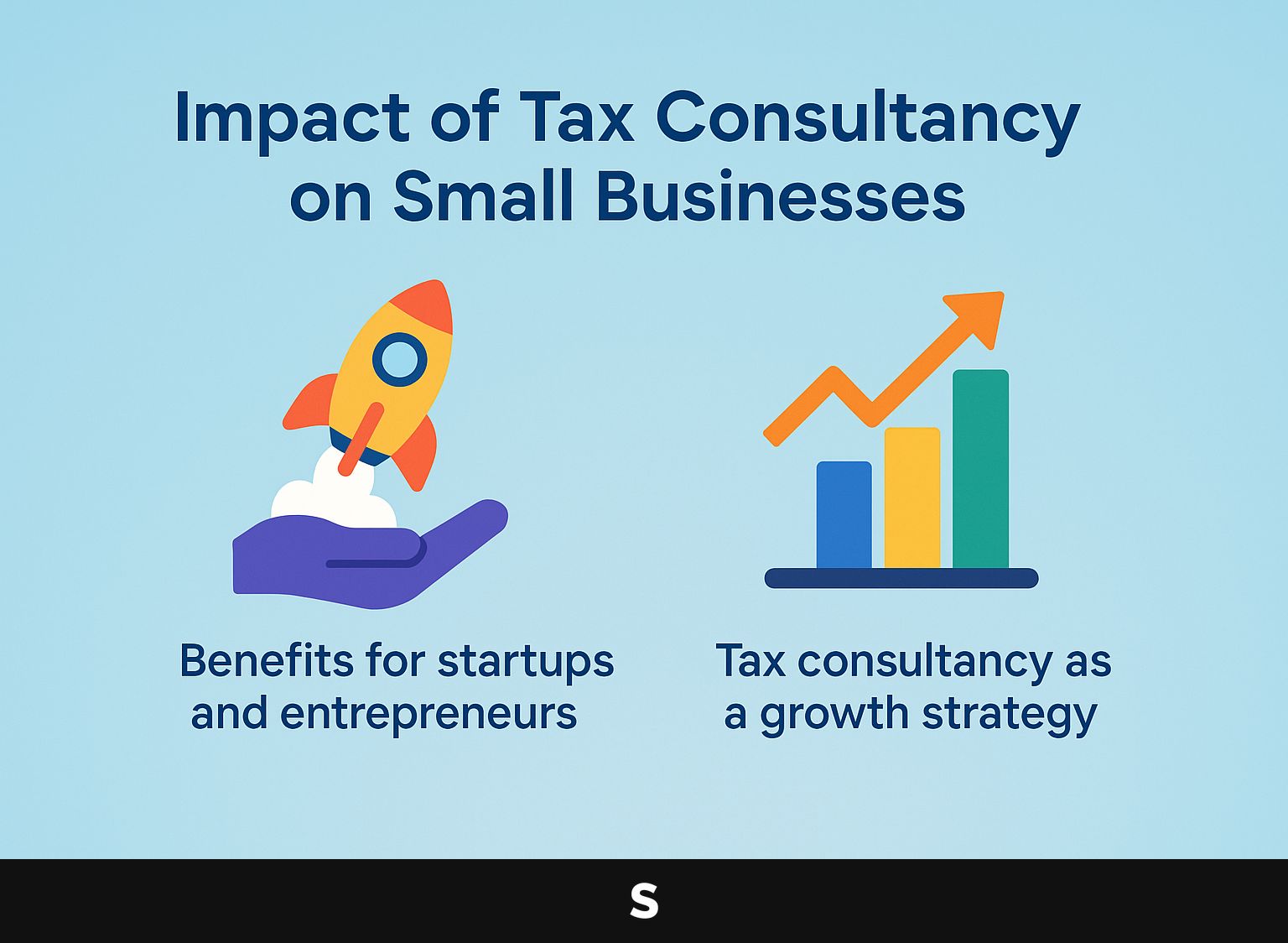
1. Benefits for startups and entrepreneurs
New businesses and entrepreneurs can rely on tax consultancy to establish solid financial foundations, remain compliant, and take advantage of potential savings.
Consultants provide important services such as business entity setup, helping you decide between LLCs and corporations based on liability and tax issues. They offer tools such as QuickBooks or Mint for tracking expenses, which help you keep an eye on your cash flow easily.
By implementing strategic tax planning, startups can identify deductions and credits, potentially saving thousands each year.
Regular financial check-ups help predict changes in rules and keep following them, which is important for lasting success. Using these services builds a strong financial base that supports growth.
2. Tax consultancy as a growth strategy
Using tax advice helps businesses improve their financial methods and concentrate on expanding instead of worrying about taxes.
For example, a manufacturing company that engaged a tax consultant managed to identify over $200,000 in potential tax credits, significantly reducing their taxable income.
Proactive tax planning helped a tech startup to structure their operations internationally, thus minimizing double taxation and maximizing profits.
Tools like TaxJar help online businesses manage sales tax rules, while experts in R&D tax credits can find unexpected savings. By including expert tax strategies in their overall business planning, companies can increase profits and achieve long-term growth.
Potential Drawbacks of Tax Consultancy
Tax consultancy can be helpful, but clients should think about possible downsides before hiring a consultant.
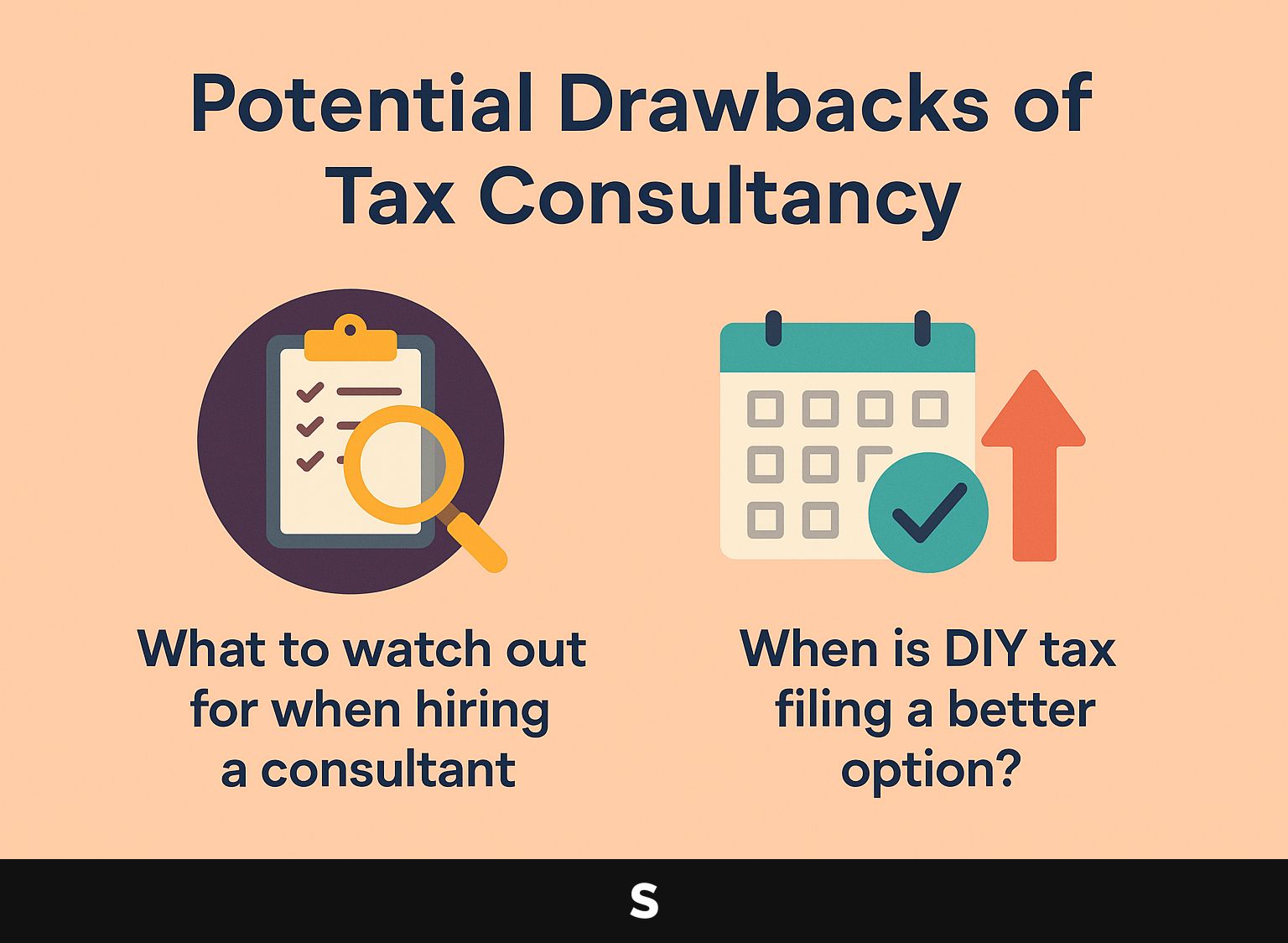
1. What to watch out for when hiring a consultant?
When hiring a tax consultant, clients should be vigilant about certain red flags, such as lack of credentials or poor communication skills. Other warning signs include limited experience, unclear billing practices, and negative online reviews.
For instance, a consultant with less than three years in the field may lack the depth needed for complex tax issues. Clients should look for testimonials and check sites like Yelp or LinkedIn for reviews.
To reduce these risks, think about doing detailed interviews and asking for recommendations from reliable sources. Look at their previous projects or case studies to confirm their methods fit your particular tax requirements.
2. When is DIY tax filing a better option?
Filing your taxes yourself can be better if your finances are simple and you don’t have many deductions.
For instance, if your income comes solely from a salaried job and you’ve only standard deductions like mortgage interest, using user-friendly software such as TurboTax or H&R Block could save money on filing fees.
If you have complex situations-like self-employment income, significant medical expenses, or investments-professional help might be warranted.
Be cautious, because handling it yourself might result in missing key deductions or making errors that could lead to audits. Carefully assess your financial complexity before deciding; if in doubt, consult a professional for guidance.
The Future Of Tax Consultancy.
1. How will tax laws affect consultancy services?
Changes in tax laws will greatly affect consultancy services, requiring professionals to stay updated and adjust their strategies.
Consultants should first familiarize themselves with the key changes, such as the alterations in deduction limits and potential new credits. Use resources like the IRS website and industry webinars to stay updated.
Next, revise client strategies by integrating tax-efficient planning, ensuring clients maximize deductions under the new rules. Think about using tools such as tax software or consulting apps (for example, Intuit ProConnect, Drake Tax) to simplify compliance and client reporting.
By actively handling these changes, you will improve client satisfaction and strengthen your consultancy’s reputation as a reliable advisor.
2. What role will AI play in tax consultancy?
AI is set to change tax consultancy by handling regular tasks automatically, improving data review, and offering customized experiences for clients.
For example, software like Intuit ProConnect Tax Online uses AI to simplify entering data and find possible tax deductions. Xero Tax uses machine learning to review tax situations and provide helpful advice, improving its accuracy.
Businesses can use tools like IBM Watson Analytics to predict upcoming trends, helping them change strategies for clients using past information.
As these technologies develop, they will make work more efficient and allow tax consultants to concentrate on giving strategic advice, providing more benefits to clients.
Frequently Asked Questions
1. What is a tax consultancy review that shows real savings?
A tax consultancy review that shows real savings is a service that evaluates your tax situation and identifies potential deductions, credits, and strategies to reduce your tax liability. These reviews are focused on achieving a return on investment and can lead to significant tax savings.
2. How does a tax consultancy review save me money?
A tax consultancy review saves you money by identifying deductions and credits that you may have missed, as well as creating a tax strategy that can minimize your tax liability. Thinking ahead can help you save a lot on your taxes, both this year and later.
3. Can anyone benefit from a tax consultancy review?
Yes, anyone can benefit from a tax consultancy review, whether you are an individual, a small business owner, or a large corporation. A review can help you understand your tax situation better and find ways to save money on your taxes.
4. How do I choose the right tax consultancy for a review?
When picking a tax advisor for an evaluation, make sure to find someone with experience in helping clients reduce their tax bills. Look for reviews, ask for references, and make sure the consultancy has experience with your specific tax situation.
5. Are tax consultancy reviews worth the cost?
In most cases, tax consultancy reviews are worth the cost, as they can result in significant tax savings that can offset the fees for the service. The knowledge and support from a tax consultancy can be very helpful in handling your taxes and lowering your anxiety during tax season.
6. How often should I get a tax consultancy review?
It is recommended to get a tax consultancy review at least once a year, preferably before the tax filing deadline. If your finances change a lot, it’s a good idea to have a review more often to make sure you use all possible deductions and credits.


